College of Human Sciences
A new zeitgeist for unprecedented success in CHS, says ED
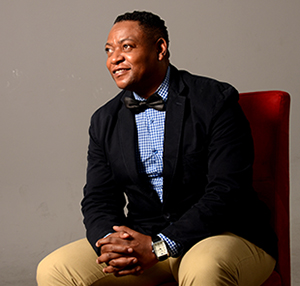
Prof Kgomotso Masemola is the newly appointed Executive Dean of the College of Human Sciences, Unisa.
"The year 2020 ushers in a new decade, a renewed spirit of optimism and a new zeitgeist for unprecedented success in the College of Human Sciences." These are the passionate words of Prof Kgomotso Michael Masemola, the newly appointed Executive Dean (ED) of the College of Human Sciences at Unisa. The ED states unequivocally that there will be unparalleled epistemic shifts in the college’s diverse scientific domains, and that it is now possible to achieve quality-driven curriculum transformation through simultaneous decoloniality and Africanisation.
Masemola, who takes over the college deanship from Prof Andrew Phillips, has worked at Unisa since 2011 after he joined from North-West University. With more than 18 years in academia, he attained his PhD in English Literature from the University of Sheffield in England, graduated with an MA in Postcolonial Studies with flying colours from the then University of Natal, attained a Bachelor of Arts in English Literature and Social Anthropology from the University of the Witwatersrand, as well as a BA Honours in Comparative Literature specialising in Literary Theory.
The ED’s research is focused on the intersection of Deleuzian theories of immanence and becoming with decoloniality’s ruminations on being and non-being, such as foregrounded by the agential representation of the "Self" and its "Other" in autobiographical writing. His sole-authored book, Black South African autobiography after Deleuze (2017), was published by Brill and Rodopi in The Netherlands and the USA.
Masemola has published articles in accredited international IBSS journals such as the Journal of African Cultural Studies, African Identities, and Critical African Studies. His articles have also appeared in South African journals such as Social Dynamics, Current Writing, English Academy Review, Journal of Literary Studies, AlterNation, Scrutiny2, African Journal for Rhetoric and Muziki: Journal of Music Research in Africa. Having additionally published in the CODESRIA-run Africa Development, he has also contributed chapters to internationally published books, including The Oxford History of the Novel in English: The Novel in Africa and the Atlantic World, and Trauma, Resistance, Reconstruction in Post-1994 South African Writing.
A significant number of his publications emerge from papers and keynote addresses he presented from as far afield as Oxford University, the University of the West Indies in Trinidad, Zurich University, Qatar University, Western Illinois University, Central Florida University, Utah University and the University of Nairobi. On invitation, as a result of further international recognition, he has contributed to the Routledge Encyclopaedia of Modernism (REM) since 2016.
Masemola currently holds a C2 NRF rating and is the Convener of an NRF Rating Panel (Literature, Languages and Linguistics) as well as an Inter-Regional Mentor for the NIHSS Doctoral School (NWU, UNISA, UFS).
Given his almost two decades in academia, Masemola, like the deans before him, brings to the College of Human Sciences a passion to better the lives of the people of this country and continent. He shares some of his thoughts with us in the interview below:
How do you feel about your appointment as Executive Dean of the College of Human Sciences?
I am optimistic that there will be a boldness to pursue innovative ideas and build a community of best practice in CHS. This is the noble pursuit of quality and excellence rather than the mediocre churning out of quantities for DHET subsidy purposes.
What are you looking forward to the most as Executive Dean?
Commonness of purpose, confluence of positive efforts and meaningful transformation of the curriculum, epistemological landscape and human resources.
What plans do you have for the college and what are you hoping to achieve?
A decade of e-quality is upon us as the College of Human Sciences kick-starts under new management. Now, more than ever, e-learning platforms are set to equalise learning opportunities for Unisa students across the globe based on quality teaching and research.
For us e-quality is a technology-based quality means to a quality end in the form of student throughput and academic output as an unapologetically African university in the service of humanity. Through e-quality, we together lead the College of Human Sciences into a high-performance college in teaching and learning, community engagement, research and innovation, and academic citizenship. Thus, for us in the CHS, the "e" in e-quality represents a confluence of effective e-learning and efficiency gains for excellence.
The ethos and praxis of e-quality prompts us to focus our research to benefit learning through open resource publishing that has a bearing on all modules from undergraduate to postgraduate supervision. We are poised to source grants for research-led teaching and teaching-led research, beyond NRF rating targets. Likewise, research collaborations shall open pathways for student exchanges with universities of good standing throughout the world.
In no small measure, we are set to increase our influence, rather than the combined quantity and impact of our outputs. We are a college that prides itself in enhancing the quality of the student teaching and learning experience as well as our researcher’s efforts. This year all of us, from academic staff to administrative support staff, will play to our strengths to maximise gains and achieve efficiency in the academic value chain. It will take minor adjustments to platformisation - and some enhancements to learning ICTs - to attain major strides for all.
How do you plan to build on the legacy created by previous deans, Professors Rosemary Moeketsi and Andrew Phillips?
The projects of decoloniality, Africa Speaks, and the reimagined mentorship programme that began during the era of Prof Moeketsi will be consolidated as necessary strengths of the CHS. They constitute a living legacy that filters into the curriculum and also signposts the direction of research in the diverse niche areas.
Likewise, Prof Phillips charted a particular course of Africanisation that brought a steadiness to the future planning of the college as well as a distinct approach to transformation. Again, this a very important legacy. However, he began norm-driven internationalisation that focuses on Africa (rather than the Euro-American West) for external benchmarking. This will no doubt continue under my Deanship from 2020 going forward.
Why is this college important for the country and continent, and how can it contribute in alleviating challenges we currently face?
The College of Human Sciences is the beacon of hope, where humanisation, self-determination and independent self-development through life-long learning are concerned, running against the grain of the technological sweep of Artificial Intelligence investments rather than human capital development. We embody the vision of an African university shaping humanities in the service of humanity.
Describe Prof Masemola outside of academia? What are your interests and hobbies?
I am a father first and foremost, and I look up daily to the Father YHWH in Heaven for guidance in all things. I also have a love for jazz, gospel and hip-hop.
What is one thing most people don’t know about you?
I am concerned about economic inequality, the current mining charter, the reticence about apartheid reparations in political discourse, and the peace process in respect of Israel and Palestine. Deeply spiritual, I write creatively, too, and have songs and poems that carry my thoughts.
Do you have any philosophies or inspirational message you would like to share? What motivates you daily?
The greatest commandment is that we love one another. No jingoism. No bigotry. Like stubborn rent-seekers and shallow rented crowds, there is no place for hatred, envy, misogyny, conspiracies and professional jealousy in the College of Human Sciences.
My 2020 quote comes from Dr Ngila M Muendane: "Never mind the land, what colonialism took away from us is independence of mind to disable us from finding ways to reclaim it by taking our powers of self-mastery, and installed the dependency syndrome that is responsible for interpersonal abuse, static thinking, poverty, corruption, lack of compassion among us—all these amounting to disunity, besides many other weaknesses."
* Compiled by Rivonia Naidu-Hoffmeester, Communications and Marketing Specialist, College of Human Sciences
Publish date: 2020-02-19 00:00:00.0


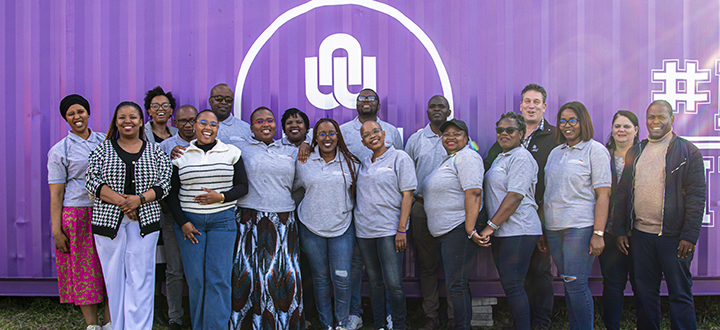 A giant leap for student success and retention
A giant leap for student success and retention
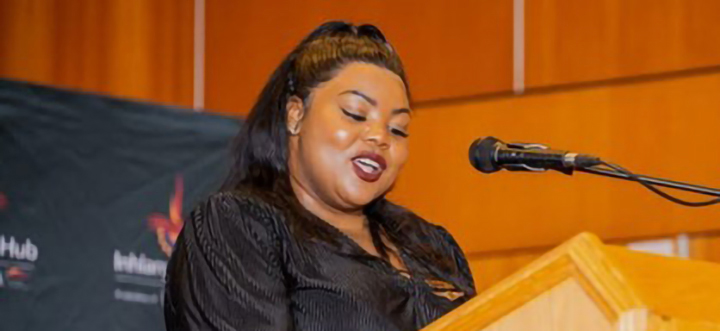 SWEEP: Where women entrepreneurs take the lead
SWEEP: Where women entrepreneurs take the lead
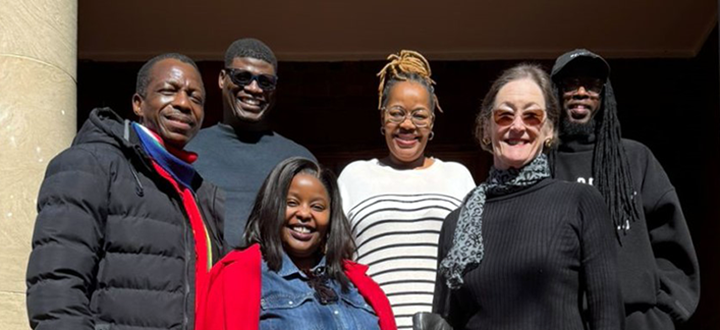 A sense of belonging and excellence nurtured through collaboration
A sense of belonging and excellence nurtured through collaboration
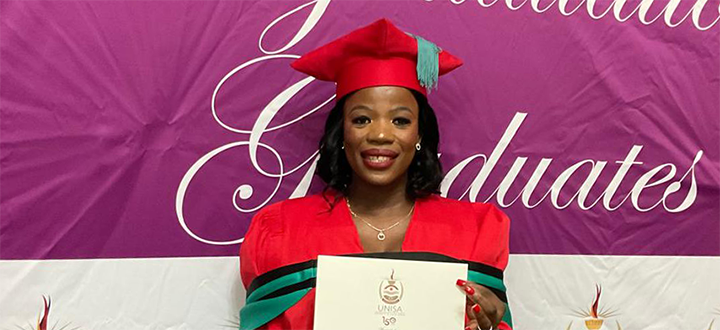 Wielding her Unisa PhD, Botswana educator champions early childhood development
Wielding her Unisa PhD, Botswana educator champions early childhood development
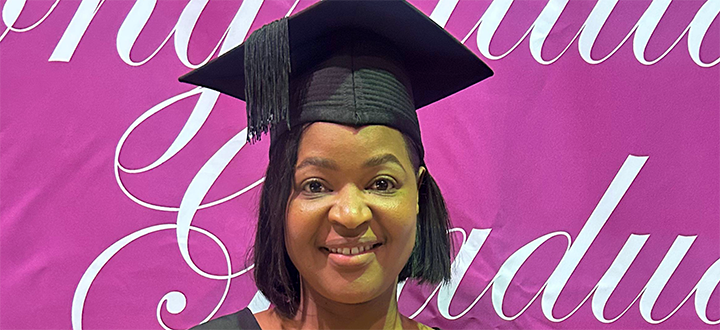 Proud Unisa alumna bridges distance and fuels career growth
Proud Unisa alumna bridges distance and fuels career growth